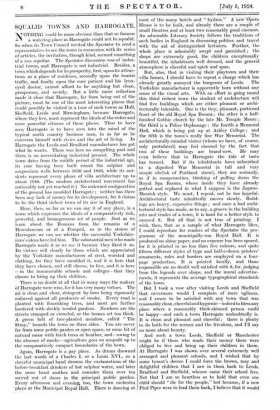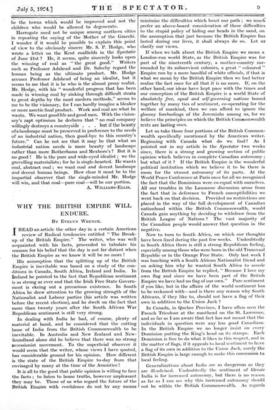SQUALID TOWNS AND HARROGATE.
NOTHING could be more obvious than that so famous a watering-place as Harrogate could not be squalid. So when its Town Council invited the Spectator to send a representative to see the town in connexion with its series of articles, the invitation, though kind, seemed something 'of a non sequitur. The Spectator discussion was of indus- trial towns, and Harrogate is not industrial. Besides, a town which depends for its prosperity, first, upon its attrac- tions as a place of residence, secondly upon the tourist traffic, and finally upon the cure patient and his lynx- eyed doctor, cannot afford to be anything but clean, prosperous, and seemly. But a little more reflection made • it clear that Harrogate, far from being out of the picture, must be one of the most interesting places that could possibly be visited in a tour of such towns as Hull, Sheffield, Leeds and Birmingham, because Harrogate, where they live, must represent the ideals of the richer and more powerful citizens of those places. Thus to have seen Harrogate is to have seen into the mind of the typical north country business man, in as far as he concerns himself with civics and the art of living. In Harrogate the Leeds and Bradford manufacturer has got what he wants. There was here no compelling past and there is no necessitating industrial present. The whole town dates from the middle period of the industrial age, its core having been built round the sulphur and magnesium wells between 1850 and 1880, while its out- skirts represent every phase of villa architecture up to about 1910. (The modern architectural movement has noticeably not yet reached it.) No awkward configuration of the ground has moulded Harrogate ; neither has there been any lack of money for its development, for it claims to be the third richest town of its size in England.
Here, then, so far as we can say it of any place, is a town which expresses the ideals of a comparatively rich, powerful, and homogeneous set of people. Just as we learn about the Romans from the remains of a Herculaneum or of a Pompeii, so in the stones of Harrogate we can see whither the successful Yorkshire- man's ideas have led him. The substantial men who made Harrogate made it as we see it because they liked it so. Its virtues will clearly be those which are appreciated by the Yorkshire manufacturers of steel, worsted and clothing, for they haVe moulded it, and it is here that they have chosen, and still choose, to live, and it is here --in the innumerable schools and colleges—that they choose to bring up their children.
There is no doubt at all that in many ways the makers . were of Harrogate ere wise, for it has very many virtues. The air is clean and clear, stringent by-laws being rigorously enforced against all producers of smoke. Every road is planted with flourishing trees, and most are further bordered with sleekly tended gardens. Nowhere are the streets cramped or crowded, or the houses set too thick. A green belt of tree-planted meadow, called " The Stray," bounds the town on three sides. You are never far from some public garden or open space, or some bit of natural moor with birch trees or heather, and—owing to the absence of smoke—agriculture goes on unspoilt up to the comparatively compact boundaries of the town.
Again, Harrogate is a gay place. As drums drowned the last words of a Charles I. or a Louis XVI., so a cheerful municipal band drowns the exclamations of the before-breakfast drinkers of hot sulphur water, and later the same band soothes and consoles them over tea served out of doors in the principal public garden. Every afternoon and evening, too, the town orchestra plays at the Municipal Royal Hall. There is dancing at . most of the many hotels and " hydros."_ A. new Opera House is to be built, and already there are a. couple of small theatres and at least two reasonably good cinemas.
An admirable Literary Society follows the traditions of such bodies in England in discussing politics. and travel with the aid of distinguished lecturers. 'urther, the whole place is admirably swept and garnished ; the shops are extremely good, the children exceptionally beautiful, the inhabitants well dressed, and the general atmosphere is cheerful and spick and span.
But, alas, that in visiting their playtown and their villa homes, I should have to repeat a charge which has already greatly annoyed the burgesses of Leeds. The Yorkshire Manufacturer is apparently born without any sense of the visual arts. With an effort in going round this third richest town the student of architecture will find five buildings which are either pleasant or archi- tecturally tolerable. One is the tiny, pleasant, porticoed front of the old Royal Spa Rooms ; the other is a half- finished Gothic church by the late Mr. Temple Moore ; the third is a Police Orphanage ; the fourth a Memorial Hall, which is being put up at Ashley College ; and the fifth is the town's really fine War Memorial. The architecturally-minded visitor (whom we have, of course, only postulated) may feel cheered by the fact that two of these buildings are brand-new. He may even believe that in Harrogate the tide of taste has turned. But if its inhabitants have subscribed to a dignified War Memorial (a tall and very simple obelisk of Portland stone), they are seriously, as if in compensation, thinking of pulling down the Royal Spa Rooms, whose inside they have already gutted and replaced in what I suppose is the Japano- Moorish style. We must, I repeat, not be too hopeful.
Architectural taste admittedly moves slowly. Build- ' ings are heavy, expensive things ; and once a bad archi- tectural style has made, so to say, a groove in the building arts and trades of a town, it is hard for a better style to succeed it. But all that is not true of printing. I wish, then, that as a sample of what Harrogate likes, I could reproduce for readers of the Spectator the pro- gramme of the municipally-run Royal Hall. It is produced on shiny paper, and no expense has been spared, for it is printed in no less than five colours, and quite fifteen different styles of type and half-a-dozen printers' ornaments, rules and borders are employed on a. four- page production. It is printed locally, and those responsible are no doubt well satisfied with it, for, judging from the legends over shops, and the mural advertise- ments, it represents the average typographical standards of the town.
But I took a vow after visiting Leeds and Sheffield that nevermore would I complain of mere ugliness, and I swore to be satisfied with any town that was reasonably clean, cheerful and hygienic—indeed to bless any place where a reasonably thick-skinned person could be happy—and such a town Harrogate undoubtedly is. It is clean and pleasant and cheerful ; there is plenty to do both for the serious and the frivolous, and I'll say no more about beauty.
And such a town Leeds, Sheffield or Manchester might be if those who made their money there were obliged to live and bring up their children in them. At Harrogate I was shown over several extremely well arranged and pleasant schools, and I wished that by some tyrant's decree I could force the brown, rosy and delightful children that I saw in them back to Leeds, Bradford and Sheffield, whence came their school fees. Not that I am so heartless as to hold that even one child should "die for the people," but because, if a new 'Pied Piper were to lead them back, I- believe that it would be the towns which would be improved and not the children who would be allowed to degenerate. Harrogate need not be unique among northern cities in repeating the saying of the Mother of the Gracchi. I wonder if it would be possible to explain this point of view to the obviously sincere Mr. S. P. Hodge, who wrote a letter on the Kent coalfields in the Special& of June 21st ? He, it seems, quite sincerely looks upon the winning of coal as " the great good." _Write's such as Professor Adshead and Dr. Saleeby regard the human being as the ultimate product. Mr. Hodge accuses Professor Adshead of being an idealist, but it seems to me that it is he who is the almost prosy realist. Mr. Hodge, with his " wonderful progress that has been made in winning coal by sinking through difficult strata to great depths by the most modern methods," seems to me to be the visionary, for I can hardly imagine a bleaker or more ascetic final product. Work and coal are what he wants. We want good life and good men. With the vision- ary's rapt optimism he declares that " no coal company willingly destroys a countryside . . . but if the beauty ofa landscape must be preserved in preference to the needs of an industrial nation, then good-bye to this country's future." Can he not see that it may be that what an industrial nation needs is more beauty of landscape rather than more Rotherhams and Mexboro's ? But it is no good ! He is the pure and wide-eyed idealist ; we the grovelling materialists ; for he is single-hearted. He wants coal, abstract coal ; we want coal and decent landscape and decent human beings. How clear it must be to the impartial observer that the single-minded Mr. Hodge will win, and that coal—pure coal—will be our portion.
A. WILLI.A.ms-Emis.



















































 Previous page
Previous page